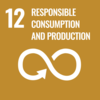Soya protein meal has long been a key ingredient in poultry feed. Its production entails major deforestation, and it is a key contributor to the colossal environmental impact of the meat and dairy industries.
That is why Nottingham Trent University’s researchers, with the help of student volunteers, have invented a novel process for extracting an ultra-high protein feed material from bioethanol waste that can replace soya in animal feed. This new material has less than one fifth of the global warming potential of soya protein meal and directly addresses the ‘feed versus fuel from crops’ debate associated with bioethanol production.
Displacing just 10% of soya with biorefinery ultra-high protein reduces the carbon footprint of a kilogram of chicken meat in the UK by 19%. 330,000 tonnes of ultra-high protein material are now being produced, and we have worked with Green Plains Inc to refine the material into an ideal protein source for poultry producers to use on farms.
This research on developing new ultra-high protein feeds has great significance for the agriculture sector. Very strong answer to the learner/graduate employment benefits section.
“Research at NTU creates life-changing opportunities. Sustainability is at the heart of everything we do. Both are encapsulated in this project which is why we are proud to have won. Our poultry feed has a significantly reduced carbon footprint, and our students have played a part in re-imagining the industry.”
Prof Edward Peck, Vice Chancellor
